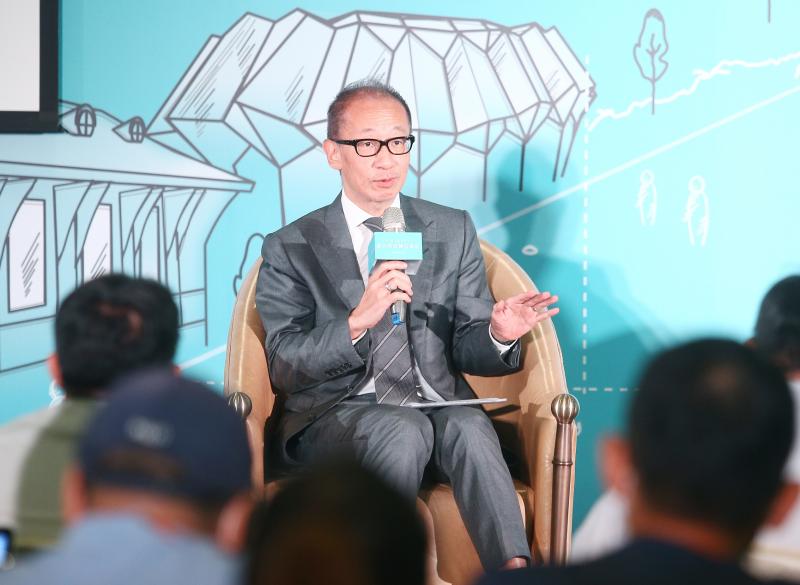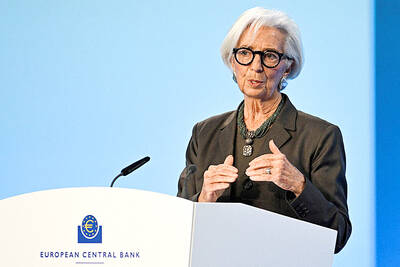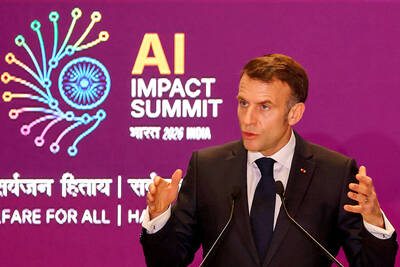Taipei Times: When do you think the hospitality industry can return to how it was before the COVID-19 pandemic? How does Formosa International Hotels Group (FIH, 晶華酒店集團) fare this quarter and beyond?
FIH chairman Steve Pan (潘思亮): The virus outbreak will have a serious impact on business travel, driven mainly by meetings, incentive travel, conferences and exhibitions over the past three decades. For the past six months, many businesspeople have grown used to exchanging information on the Internet, where more people can participate.
The trend might sustain for three to five years until people are vaccinated and it is safe to travel internationally. Even then, business travel will be 80 to 90 percent of what it was prior to the pandemic.

Photo: CNA
I am optimistic about leisure travel, which has grown into a modern lifestyle that has survived the Spanish Flu, World War I and World War II. Leisure travel will come back in a big way, as evidenced by the ongoing boom in domestic tourism.
All of our properties outside Taipei are breaking records in occupancy and revenue. Leisure travel will resume with local trips, then within the country, the region and internationally.
Intercontinental travel will be last to come back and might not happen in one or two years depending on the development of vaccines.
TT: Can all hotels in Taipei survive the border controls and travel restrictions?
Pan: Local tourism will continue to thrive next year when there will still be very limited international travel due to lingering border controls. Hotels reliant on business travel will remain under pressure. Particularly, hotels in Taipei will need to transform.
The more the hotels rely on international customers, the harder the blow of the pandemic on their business. Regent Taipei (台北晶華酒店) quickly repositioned itself from an international luxury facility focused on business travelers to an urban resort.
Other urban peers such as Mandarin Oriental Taipei (文華東方酒店) opted out partially, succumbing to a sharp decline in business. More hotels would collapse if the government ends its subsidies. I would say that perhaps 10 to 20 percent will go out of business. Business hotels in Taichung and Kaohsiung are less affected, because they are destinations for travelers from Taipei.
This scenario means that hotels in Taipei will continue to suffer. Taipei needs to reposition itself as a resort destination like Singapore, where you can do business as well as sightseeing. The city’s hotels have to reinvent themselves and embrace the domestic market.
TT: Should the government keep wage subsidies and tax breaks for hotels as long as border controls remain in place?
Pan: I would recommend that the government limit subsidies to hotels severely affected by border controls and travel restrictions. It does not need to subsidize hotels that are not doing well with or without the pandemic.
TT: Can the boom in domestic tourism offset the absence of foreign tourist arrivals?
Pan: Foreign tourist arrivals total about 10 million per year, but more Taiwanese vacation abroad and outspend inbound tourists. So, if Taiwanese can keep their travel spending in the domestic market, the outbreak’s effects will be minimal.
Even if local tourists would just keep part of their spending in Taiwan, it would be very helpful. Domestic tourism will continue to prosper through next year or even farther. Whether they can maintain a high level of activity depends on how much they can improve so that Taiwan can compete with Japan and Southeast Asia in attracting international tourists. The nation has a two-year window in which to boost competitiveness.
Our Silks Place (晶英) and Just Sleep (捷絲旅) properties outside Taipei are breaking records with double-digit percentage growth.
Regent Taipei has taken a major setback. However, it is better off than other international or domestic brands. Our operating performance and occupancy are twice that of other five-star facilities in Taipei, even though all are losing money.
International customers used to account for 85 percent of our customers. Now we will have 100 percent of local guests.
TT: Has the virus outbreak affected FIH’s development?
Pan: We recently called off a collaboration pact with Chunghwa Post Co (中華郵政) in operating its planned office-turned hotel in Taipei. The decision had little to with the pandemic, but was caused by a lengthy delay. We signed the deal five years ago, but Chunghwa Post has not yet started construction.
FIH sees a great opportunity to expand its scale amid the pandemic. We are going to aggressively grow the Regent brand in Taiwan. We want to make a presence in Taipei’s Xinyi District (信義), in Taichung and in Kaohsiung. We intend to add two prime resorts using the Regent brand as well.
We have all of the advantages that international brands can offer, mainly their distribution network, as we are aided by InterContinental Hotels Group PLC, but none of their disadvantages. International brands are less flexible and agile in adapting to domestic tourism, for instance. We have the best-yet global management team, and have outperformed international and domestic brands over the past 30 years, no matter which way you look at it.
We are reaching out to both existing and new high-end hotels. Four Seasons Hotel Shanghai was rebranded Regent Shanghai Pudong on May 16. We are in talks with potential partners, but nothing has been finalized yet.
TT: You have mentioned seeing the return of a “golden age” for Taiwan amid US-China trade tensions. Do you still stand by that observation?
Pan: Yes — and I’m more convinced now. Since 2018, I have seen top-ranking business travelers — senior corporate executive officers and university leaders — coming to Taiwan. The trend has gained further traction amid the pandemic.
Taiwan is becoming a favored partner as the trade dispute evolves into a technology competition. I think Taiwan has the chance to grow into a well-being superpower, as evidenced by its efficient control of the virus’ spread. The goal is achievable if Taiwan continues to receive high-profile visitors and investment inflows, which are happening.
The twists are favorable for Taiwan, and policymakers should do whatever they can to facilitate and streamline visa, residency and investment terms — and cut bureaucracy.
That does not mean Taiwan should have more hotels. The industry peaked in 2015 and has since suffered indigestion. I know some new projects are in the pipeline, but most will go away in the end.
TT: FIH turns 30 years old this year. How do you expect the company to grow in the future?
Pan: We aim to be the most important and admired hospitality company in Taiwan, or the pride of Taiwan, like Taiwan Semiconductor Manufacturing Co (台積電) in the semiconductor industry.
The past six months have been difficult and unprecedented. Business was down 90 percent in March and April, but we held our ground by engaging the government, offering employee training and overhauling our business strategy.
FIH has proved to be stronger each time a crisis hits. In fact, crises have redefined FIH over the past 30 years. We acquired Domino’s Pizza’s operations in Taiwan when SARS struck in 2003. We bought the Regent brand in the 2008 global financial crisis. This time, we see the opportunity to grow our scale.

European Central Bank (ECB) President Christine Lagarde is expected to step down from her role before her eight-year term ends in October next year, the Financial Times reported. Lagarde wants to leave before the French presidential election in April next year, which would allow French President Emmanuel Macron and German Chancellor Friedrich Merz to find her replacement together, the report said, citing an unidentified person familiar with her thoughts on the matter. It is not clear yet when she might exit, the report said. “President Lagarde is totally focused on her mission and has not taken any decision regarding the end of

French President Emmanuel Macron told a global artificial intelligence (AI) summit in India yesterday he was determined to ensure safe oversight of the fast-evolving technology. The EU has led the way for global regulation with its Artificial Intelligence Act, which was adopted in 2024 and is coming into force in phases. “We are determined to continue to shape the rules of the game... with our allies such as India,” Macron said in New Delhi. “Europe is not blindly focused on regulation — Europe is a space for innovation and investment, but it is a safe space.” The AI Impact Summit is the fourth

CONFUSION: Taiwan, Japan and other big exporters are cautiously monitoring the situation, while analysts said more Trump responses ate likely after his loss in court US trading partners in Asia started weighing fresh uncertainties yesterday after President Donald Trump vowed to impose a new tariff on imports, hours after the Supreme Court struck down many of the sweeping levies he used to launch a global trade war. The court’s ruling invalidated a number of tariffs that the Trump administration had imposed on Asian export powerhouses from China and South Korea to Japan and Taiwan, the world’s largest chip maker and a key player in tech supply chains. Within hours, Trump said he would impose a new 10 percent duty on US imports from all countries starting on

STRATEGIC ALLIANCE: The initiative is aimed at protecting semiconductor supply chain resilience to reduce dependence on China-dominated manufacturing hubs India yesterday joined a US-led initiative to strengthen technology cooperation among strategic allies in a move that underscores the nations’ warming ties after a brief strain over New Delhi’s unabated purchase of discounted Russian oil. The decision aligns India closely with Washington’s efforts to build secure supply chains for semiconductors, advanced manufacturing and critical technologies at a time when geopolitical competition with China is intensifying. It also signals a reset in relations following friction over energy trade and tariffs. Nations that have joined the Pax Silica framework include Japan, South Korea, the UK and Israel. “Pax Silica will be a group of nations